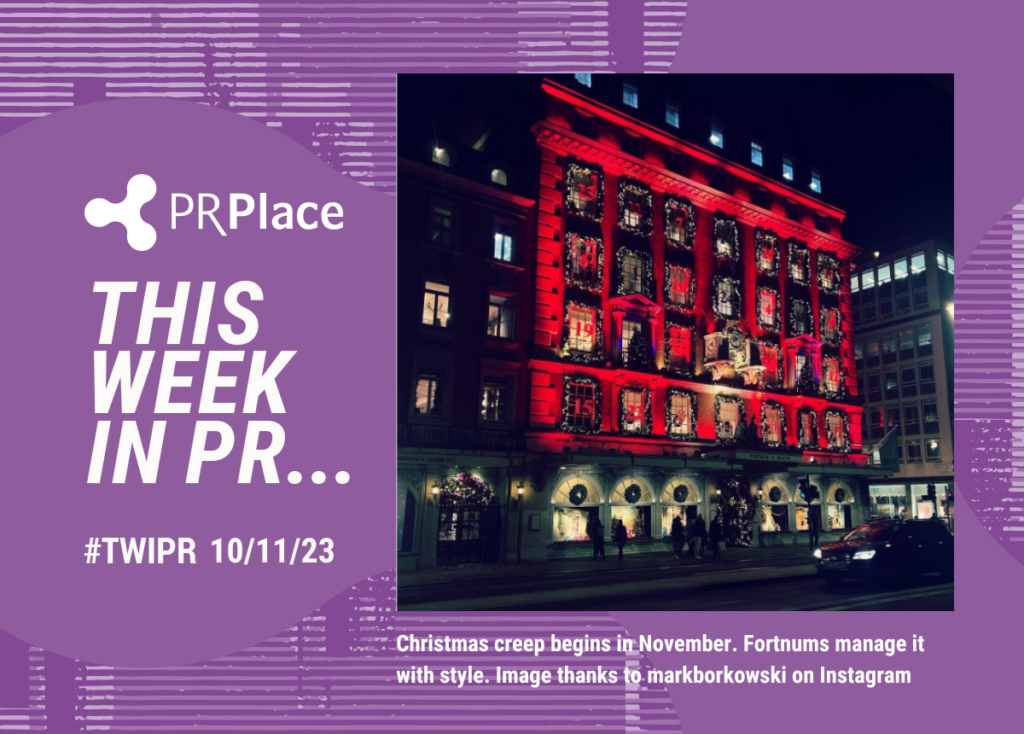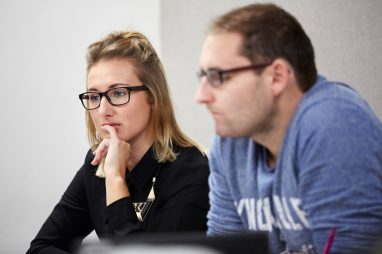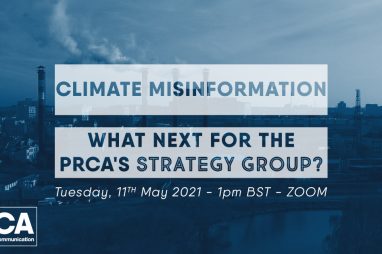This week in PR (10 November)

About the author
Richard Bailey Hon FCIPR is editor of PR Academy's PR Place Insights. He teaches and assesses undergraduate, postgraduate and professional students.

It happened this week
- Melissa Fleming: The Urgent Case for Information Integrity (November)
‘In all my years in communications, I can’t say I ever worked in such a troubled environment – an information ecosystem so polluted that voices for positive change are struggling to make themselves heard.’
- Beth Colmer: #ConsumerCorner: Christmas advert celebrities; the mark of a successful year? (7 November)
‘This year’s ads however, are far less weepy and much more star studded as Ryan Reynolds, Hannah Waddingham, Dawn French, Graham Norton, Michael Buble and Alison Hammond dance and sparkle across our screens.’
Purpose, climate and ESG
SUSTAINABILITY COMMUNICATION DIPLOMA
- Ben Monteith: Are communicators rising to the climate crisis challenge? (7 November)
‘The climate crisis is one of the biggest challenges in the planet’s history – and while everyone has a responsibility to tackle it, few professions have quite the same burden as communicators.’
- Mark Goyder: Wake up and smell the 21st century coffee – three post Anthropy challenges for boards (6 November)
‘The UK is one of most bio-diversity depleted countries in the world. We only have half of it left. We are in the bottom 10% globally. Nature in this country is in a state of neglect. Yet politicians of all parties talk glibly about economic growth without acknowledging that the only growth worth having is one which respects and works with nature.’
Consulting, skills and careers
- Keith Smith: Five words that will win you new business (no date)
‘Rather than, as soon as the pleasantries are over, you barrel into why your agency is the right choice, just put yourself in your prospect’s shoes and ask: “What’s in it for me?”’ - Dan Gold: Siblings in sync: Emily & Liam Keogh Unveil Palm PR’s story
(7 November)
‘Most of our adult working life we’ve been working together. The key learning we’ve taken over the years is to divide and conquer, and not to try to do the same thing.’
Gender, diversity, health and wellbeing
- Christian Koch with Subira Jones: PRs and burnout: an expert speaks (8 November)
‘I don’t believe in work-life balance; work-life satisfaction is more important. Before suffering burnout in my old job, I went to the gym six days a week. Today, I still work ridiculous hours, but because I love my work and am fulfilled by it, I don’t burn out. And when my battery is run down, I do something about it.’
- Advita Patel: Diwali: Light over darkness (8 November)
‘This week starts Diwali celebrations for many Hindus, Sikhs, Jains and other faiths. Diwali means different things to different cultures, but ultimately, each story and legend generally believes it’s when light overcomes darkness and good triumphs over evil.’
- Ben Smith: Celebrating 15 years of the Taylor Bennett Foundation: How the programme helped the careers of Kwaku Aning, Shanice Hoo Mills and Toni Adeola [podcast] (7 November)
‘The Taylor Bennett Foundation seeks to address the lack of diversity in the communications industry. It has made great strides since it was founded in 2010.’
Politics, public affairs and public sphere
- Matt Redley & James Surallie: The AI Safety Summit started vital conversations, but key questions remain (9 November)
‘Even though some may argue that the UK is getting left behind on AI regulation, with the EU and US now storming ahead, this summit was arguably more about optics than substance. It appears the summit’s main goal was to start a global conversation about frontier AI models, and, on that objective, it certainly succeeded.’ - Perry Miller: Drifting to defeat (9 November)
‘For Sunak, the ongoing stirring of the political pot by Home Secretary, Suella Braverman, is proving tricky terrain to navigate. The fact that he has so far resisted the urge to rein in her wilder comments, suggests he either lacks the power or the inclination to do so.’ - Fabian Cooper: Why Labour’s New Towns might not be all that they are cracked up to be. (9 November)
‘Unfortunately, while it’s clear that the country is crying out for more housing, New Towns have been tried, tried, and tried again. And evidence shows that they aren’t a particularly great idea.’ - Chris White: King’s Speech: a changing of the guard (7 November)
‘In a year’s time we may look back at this King’s Speech as the moment where it was not only a changing of the guard for the new monarch, but the beginning of the end for this Conservative government.’
Brands, content, community and creativity
- Chris Lee: How to build company executives’ profiles on LinkedIn (7 November)
‘I still think a lot of brands are missing out on the opportunity by not investing time in a LinkedIn-specific content strategy focussed specifically on their executives. And by ‘content’, I don’t just mean the written word; video is incredibly impactful on LinkedIn, but not everyone is comfortable in front of the camera.’ - Alex Malouf: Learnings On Launching A Brand (3 November)
‘It’s not every day that you are going to be able to launch a brand or a company. Not everything will go your way, and that’s okay. As long as you’ve put in the effort, you deserve to step back for a moment and enjoy what you have achieved. Soak it in and take a moment to recognize what you and your team have achieved.’
Research, data, measurement and evaluation
- Paul Cheal: Measurement Month with Mark Weiner: Begin Simply, Simply Begin [podcast] (8 November)
‘I saw a sign outside a coffee shop in California: it said ‘begin simply; simply begin’ and that was the answer [to PR ROI]. I’m not a Math person, I don’t get statistics, but if you begin simply, but just get started, you have an opportunity.’ - Leigh Greenwood: Businesses rightly invest in the things that deliver ROI – that can be PR if it avoids red herring metrics (no date)
‘Frankly, too much PR activity is operating at a tactical level, with media coverage, backlinks and social media engagement seen as end goals and, therefore, the driver behind ideation, planning and measurement.’
Crisis, risk and reputation
- Emma Drake: Brand reputation, Gen Z, and honesty in communication [podcast] (9 September)
‘Brand reputation has become the crucial element for organisation success. Great if you’re a comms professional – but incredibly challenging at the same time.’ - David Yelland and Simon Lewis: Rishi and Elon, Robert de Niro and that M&S ad [podcast] (8 November)
‘The moment it was pointed out to M&S – on Instagram I think it was – that it appears they were burning the Palestinian colours – at that moment, if the board of M&S had continued with the advert, they would have been unable to deny that they didn’t know that it was a risk. And the risk of it spiralling out of control would have been quite acute.’
Internal communication
INTERNAL COMMUNICATION DIPLOMA
- Katie Macaulay with Sim Sian and Yvonne O’Hara: A shared vision: ED&I and IC in action [podcsast] (8 November)
‘An employer value proposition very simply is the articulation of the employer’s brand. And that has meaning to people who might be thinking of joining the organisation. But it’s also incredibly important to people who exist within the organisation. And it’s everything from the culture of the organisation through to the benefits that are offered, the career progression, the leadership tone in the organisation, it’s really everything that makes that organisation tick, as well as the products and services they sell or provide. - Rachel Miller: Podcast: An introduction to AI for internal communicators (3 November)
‘A basic hypothesis of AI is that computing power can recreate the human brain’s capacity for intelligence and ultimately to succeed it.’
Media, digital and technology
- Tom Flynn: The SEC Newgate AI Weekly (9 November)
‘The biggest news this week came from the much-anticipated OpenAI developer conference. With CEO Sam Altman hyping the event with his “real christmas eve energy rn” post on X (formerly Twitter), all eyes were on San Francisco on Tuesday and the company did not disappoint.’ - Rich Leigh: Reach redundancies – what does this mean for PR? (8 November)
‘Fewer opportunities for coverage in the UK’s largest news publisher inevitably means fewer opportunities for links in those titles. Fewer opportunities for regional, data-led stories, and far more importantly, less chance of local news being reported – a trend I’ve watched only worsen over the last few years.’ - Paul Sutton with Gini Dietrich: Need to know: the impact of technology on the future of PR [podcast] (8 November)
‘How are you going to create content that’s so robust that Google can’t just take the snippet and not give the link? These pieces of ‘pillar content’ are a real opportunity for PR.’ - Katie King: Not using AI yet? Here’s three ways for PRs to get started (7 November)
‘In the business of people and relationships, practitioners need to be thinking ahead about ways that they can build and strengthen their partnerships with technology.’
- Trevor Cook: Unpacking the marketing communications ‘jigsaw’ (and where the heck does PR fit into the equation?) (5 November)
‘I’m a massive believer in going wide first to try and understand the big picture, and then armed with a plan, draw your focus back in on those tactics that make sense for your business and what it is you’re setting out to achieve.’ - Neville Hobson: The Pebble phoenix and the X effect (6 November)
‘Despite being a promising alternative [to X/Twitter], Pebble struggled to carve out a substantial user base amidst fierce competition. The rapid evolution of the competitive landscape, with many platforms offering similar features, heightened the challenge for Pebble to distinguish itself and gain traction. Ultimately, it couldn’t.
Academic, education and training
Here’s Claude AI’s summary of the latest report from the US-based Commission on Public Relations Education edited by Elizabeth Toth and Pamela Bourland-Davis.
Here are some key points from the report “Navigating Change: Recommendations for Advancing Undergraduate Public Relations Education”:
- The report celebrates the 50th anniversary of the Commission on Public Relations Education (CPRE) and provides recommendations to improve undergraduate public relations education based on a survey of educators and practitioners.
- Key recommendations include promoting a six-course standard for undergraduate PR programs (principles, research, writing, campaigns, internship, ethics), integrating critical and strategic thinking throughout the curriculum, embedding data analytics and AI skills, incorporating ethics across courses, understanding DEI as an ethical responsibility, and addressing challenging social issues.
- The report highlights the need to develop students’ critical thinking and strategic skills to solve problems and meet employers’ expectations. It emphasizes hands-on learning like internships to gain professional experience.
- Ethics is a major focus, with recommendations to build competencies through case studies and ethical decision-making models. Practitioners indicated new graduates lack mastery of essential ethics skills.
- The importance of diversity, equity and inclusion (DEI) is affirmed but more progress is needed. Educators must approach DEI as a core ethical responsibility.
- Technology, AI and data analytics are transforming PR so students need analytical skills to draw and communicate insights, though not full data science expertise. Spreadsheets and data ethics are important to cover.
- The report argues PR plays a role in social change through relationships and advocacy. Educators should address challenging issues like gender, race, and poverty to prepare students.
- Overall, the report reflects high expectations for graduates to be strategic thinkers, understand data, apply ethical standards, value DEI, and recognize PR’s social role. It makes recommendations to continue elevating PR education.


